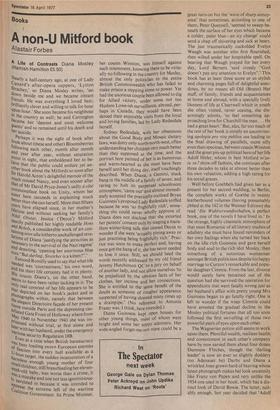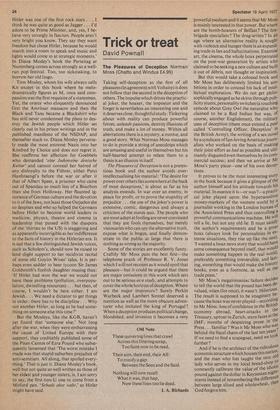Books
A non-U Mitford book
Alastair Forbes
A Lite of Contrasts Diana Mosley biamish Hamilton £5.50)
Nearly a half-century ago, at one of Lady Cunard's after-opera suppers, 'Lytton Strachey, so Diana Mosley writes, `sat down beside me and we became instant friends. He was everything I loved best; brilliantly clever and willing to talk for hour uPon hour.' She soon became his neighbour in the country as well; he and Carrington became her 'dearest and most welcome guests' and so remained until his death and her suicide. Perhaps it' was the sight of book after book about (these and other) Bloomsberries following each other, month after month and year after year, without saturation Point in sight, that emboldened her to believe that the public could endure yet another book about the Mitfords so soon after Sir Harold Acton's delightful memoir of the Much missed Nancy, and even sooner after that of Mr David Pryce-Jones's sadly a cote commonplace book on Unity, whom her sister here succeeds in explaining much better than she can herself. More than fifteen lifetime have elapsed since, in her mother's and without seeking her family's Nihu Obstat, Jessica (lDecca') Mitford saucily published her highly readable Hans 4ncr Rebels, a considerable work of art containing inter aliu hitherto unchallenged revelations of Diana 'justifying the atrocities as necessary to the survival of the Nazi regime' and drawling, 'opening her enormous blue eyes "But darling, Streicher is a kitten !".' Esmond Romilly used to say that what life needed was 'contrastiness,' his own word, andhis short life certainty had it in plenty. H15 is cousin Diana's, on the other hand, "eems to have been rather lacking in it. The .u.111Y real contrast of her life appears to be Mat depicted on her book's jacket and in tTleftographs within, namely that between he elegant Directoire facade of her present t°„Ille outside Paris and the depressing cas lated Gate Front of Holloway where from May 1940 to November 1943 she was imrr isoned without trial, at first alone and a wi ter with her husband, under the emergency artime security Regulation 18B. , Even at a time when British bureaucracy o'fas busy loading sworn European enemies 1, ,fascism into every hull available as a i;";ooat target, the sudden incarceration of a s„,rnless enough young mother of four Children, still breastfeeding her elevenweek-old baby, was worse than a crime, it 1,.as a mistake and one not less ignominious Persisted la.): in because it was intended to r.PPease the extreme left of the wartime
• -oalition Government. Its Prime Minister,
her cousin Winston, was himself against such internment, knowing there to be virtually no following in the country for Mosley, almost the only politician in the entire British Commonwealth who has failed to make prison a stepping stone to power. Yet had the uxorious couple been allowed to dig for Allied victory, under some not too Hudson Lowe-ish surveillance, abroad, perhaps in Canada, they would have been denied their enjoyable visits from the loyal and loving families, led by Lady Redesdale herself.
Sydney Redesdale, with her obsessions about the Good Body and Mosaic dietary laws, was dotty only north-north-west, often understanding her children very much better than they supposed at the time, and the portrait here painted of her is as humorous and warm-hearted as she must have been herself until her dying day, itself touchingly described. When Diana, a Gemini, stuck bang in the middle of a family of seven, and raring to bolt its perpetual schoolroom atmosphere, 'came out' and almost immediately accepted the poetically-inclined Bryan Guinness's proposal Lady Redesdale sniffed because he was `so frightfully rich', something she could never wholly approve of. Diana does not disclose that she extorted her parents' consent only by staging a marathon winter-long sulk that caused Decca to wonder if she were `actually pining away or just practising being frightfully rich.' Practice was soon to make perfect and, having once got the hang of it, she has never needed to lose it since. Still, we should heed the words recently addressed by my old friend Jeremy Hutchinson QC to a jury on behalf of another lady, and not allow ourselves 'to be prejudiced by the obvious facts of her clothes, her income and her connections. She is entitled to the same benefit of the doubt as someone of rougher appearance suspected pf having shinned many times up a drainpipe.' (No reference to Antonia Fraser was, 1 think, here intended.)
Diana Guinness kept open houses for other young things, most of whom were bright and some her sopPY admirers. Her wide-angled forget-me-not stare could be a
great turn-on but the `wave of sharp annoyance' that sometimes, according to one of them, Peter Quermell, 'seemed to sweep beneath the surface of her eyes which became a colder, paler blue—an icy change' could send a chap off shivering and sick at heart. The just traumatically cuckolded Evelyn Waugh was another who first flourished, then wilted under her hospitable spell. On hearing that Waugh prayed for her every day, Lord Berners 'said crossly -God doesn't pay any attention to Evelyn".' This book has at least three score or so stylish and charming pages full of delightful anecdotes, by no means all Old (Bruno) Hat stuff, of family, friends and acquaintances at home and abroad, with a specially lively likeness of life at Chartwell which in youth she often visited, never ceasing, she disarmingly admits, `to feel something approaching love for Churchill the man ... He had a great heart.' But, alas, far too much of the rest of her book is simply an unconvincing apologia pro vita publica sua leading to the final drawing of parallels, more silly even than specious, between cousin Winston and the great pin-up political hero of her life Adolf Hitler, whom in best Mitford in'astu vu ? show-off fashion, she continues after three decades to take at almost better than his own valuation, adding a high rating for his social graces.
Well before Goebbels had given her as a present for her second wedding, in Berlin, the complete works of Goethe in twenty leatherbound volumes (having presumably jibbed at the 142 in the Weimar Edition) she read 'Die Wahlverwandischalten, a perfect book, one of the novels I have lived in.' In the strange, highly cinematic atmosphere of that most Romantic of all literary studies of adultery she must have found reminders of her own feelings when she turned her back on the idle rich Guinness and gave herself body and soul to the rich idol Mosley, then something of a notorious womaniser amongst British politicians despite his happy marriage to Curzon's remarkable and popular daughter Cimmie. From the last, divorce would surely have remained out of the question had she survived the operation for appendicitis that went fatally wrong just as her husband's affair with pretty young Mrs Guinness began to go fatally right. One is left to wonder if the wiser Cimmie could have arrested the gradual decline in the Mosley political fortunes that all too soon followed the first swivelling of those two powerful pairs of eyes upon each other.
The Wagnerian potion still seems to work upon them. Plentiful wealth, resilient health and contentment in each other's company have by now earned them about four dozen Dunmow Flitches, though the 'darling leader' is now an ever so slightly doddery (no Adenauer he) Darby and Diana a wrinkled Joan grown hard of hearing whose latest photograph makes her look uncannily like Franz von Papen and very unlike the 1934 one used in her book, which has a distinct look of David Bowie. The latter, suitably enough, last year decided that 'Adolf
Hitler was one of the first rock stars . . . I think he was quite as good as Jagger . I'd adore to be Prime Minister, and, yes, I believe very strongly in fascism. People aren't very bright you know. They say they want freedom but chose Hitler, because he would march into a room to speak and music and lights would come in at strategic moments.' In Diana Mosley's book the Parteitag at Nuremberg comes across strongly as a wellrun pop festival. Too, too sickmaking, to borrow her old lingo.
Tom Mosley, whom his wife always calls Kit except in this book where he melodramatically figures as M, once said compassion was the first requisite of a statesman. Yet, the orator who eloquently denounced first the Amritsar massacre and then the Black and Tans became a Blackshirt who has still never condemned the plans to destroy the Jewish people which Hitler set clearly out in his prison writings and in the published manifesto of the NSDAP, and thereafter stuck to. Diana Mosley perversely made the most extreme Nazis into her Kindred by Choice and does not regret it. She reaffirms her affection for Goebbels who demanded 'eine Judenreine deutsche Kultur' and cannot conceal her hatred of any disloyalty to the Fiihrer, either Putzi Hanfstaengl's before the war or after it that of Albert Speer, a prisoner who came out of Spandau so much less of a Bourbon than she from Holloway. Her flaunted ignorance of German culture and the devotion to it of the Jews, not least those Ostjuden she so despises and who so helped the Germans before Hitler to become world leaders in medicine, physics, theatre and cinema (a leadership that passed with the diaspora of the 'thirties to the US) is staggering and as apparently incorrigible as her indifference to the facts of history in the Hitlerian era. It is sad that a few distinguished Jewish voices, such as Scholcm's, should now be raised to lend slight support to her recidivist recital of some old Goyim Wives' tales. It is perhaps even sadder to hear tycoon Sir James Goldsmith's foolish daughter musing thus: 'If Hitler had won the war we would not have these problems (pollution, overpopulation, dwindling resources) . but then, of course, I wouldn't be here either. I am Jewish . . We need a dictator to get things in order: there has to be discipline . . Why not another Hitler, as long as he had something on someone else this time?'
But the Mosleys, like the ,KGB, haven't yet found that 'someone else.' Not long after the war, when they were embarrassing the cause of United Europe with their support, they creditably published some of the Pisan Cantos of Ezra Pound who subsequently lamented that 'The worst mistake I made was that stupid suburban prejudice of ant i-semit ism. All along, that spoiled everything.' That is just it. Diana Mosley's book, well but not quite so well written as those of her eldest and younger sisters, is, I am sorry to say, the first non-U one to come from a Mitford pen. 'Schack ober wahr,' as Hitler might have said.







































 Previous page
Previous page